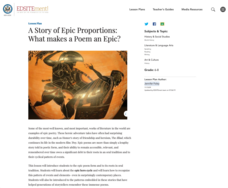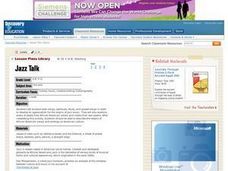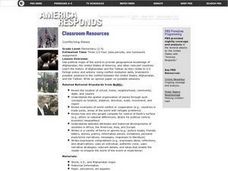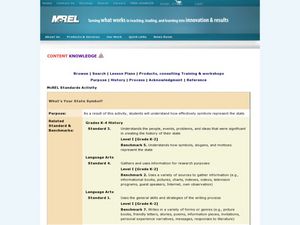National Endowment for the Humanities
Arabic Poetry: Guzzle a Ghazal!
Students research the evolution and cultural significance of the Arabic ghazal form of poetry. They, in groups, compose an original ghazal poem and read it aloud to the class.
Crafting Freedom
George Moses Horton: Crafting Virtual Freedom Through Poetry
What is "virtual freedom"? How about "enslaved entrepreneurship"? Class members will learn about these terms and much more as they read the poems and examine the life of George Moses Horton.
National Endowment for the Humanities
A Story of Epic Proportions: What Makes a Poem an Epic?
Learners analyze the epic poem form and its roots in oral tradition. In this epic poetry lesson, students research the epic hero cycle and recognize the pattern of events and elements. Learners analyze the patterns embedded in the stories.
Curated OER
The Palm of My Heart: Poetry By African American Children
Elementary students explore African American culture by reading children's poetry. They read the book, The Palm of My Heart which features poetry by an assortment of young African American boys and girls. Students define several...
Curated OER
Say Hi to Haibun Fun
Students examine the Japanese writing form of Haibun. They identify the elements of Japanese prose and poetry, analyze a haibun for writing devices, complete a graphic organizer, and compose an original haibun as a form of journal keeping.
Curated OER
Poetry--Homeless People
Eighth graders create a poem about homeless people using images they saw on websites. After reading the book "The Outsiders", 8th graders make connections of real life homeless people with characters in the book. Students search the web...
Curated OER
Analyzing Poetry and Characters
Students investigate historical context by reading poetry. In this language arts instructional activity, students discover the work of Michael Longley and examine his poem "Ceasefire." Students identify the sonnets used in the piece...
Curated OER
Border Legends, Myth, & Folklore
Students examine the narrative forms and tales unique to the U.S.-Mexico border. They discuss the possible sociological meanings of these stories, and then write their own versions to demonstrate that they explain the forms.
Curated OER
Lesson Plan for Korea: P'ansori
Twelfth graders read different versions of P'ansori in an attempt to gain exposure to this form of literature. They gain information in order to help understand the context of how they are part of the Korean culture.
Bully Free Systems
Bully Free Lesson Plans—Eighth Grade
Middle schoolers are likely very familiar with the concept of bullying and cliques. Discuss their experiences and brainstorm ways to handle peer conflict and feelings of exclusion with a poem that focuses on bullying, and a second lesson...
Curated OER
Say Hi to Haibun Fun
What is a haibun? With this interesting lesson, writers will experience the Japanese writing form haibun, identify elements important to Japanese writing styles, analyze a haibun, and compose their own. Different from the typical journal...
Curated OER
Language Arts: Lewin Project
Fourth graders read and respond to the poem, "When I Am Angry." They complete surveys by analyzing the most common feeling and draw a bar graph of their behavior, using different colors to identify the duration of various feelings. ...
Curated OER
Out of the Dust
Learners create a poem that expresses the physical and emotional turmoil of living through the Dust Bowl. For this Out of the Dust lesson, students research facts about the time period and discuss the cause-effect patterns associated...
Curated OER
Jazz Talk
Students analyze the origins of jazz music by examining work songs, spirituals, blues, and gospel songs as well as works of poetry from African American artists. They create their own poems from either the narrative, dramatic, or lyric...
Curated OER
An Ancient Revolution: The Written Word
Students examine the Bible, one of the earliest written sources, as a compilation of narratives, and search the resources on the HERITAGE DVD-ROM for historical "proof" as well as create their own stories and scripts based on ancient...
Curated OER
Exploring the Life of a Slave
Eleventh graders explore importance of abolitionists who worked to advance freedoms of black Americans prior to/during Reconstruction era, read and identify key concepts in Frederick Douglass's narrative, recognize how Douglass's slave...
Curated OER
Three Coffles Lesson Plan
Learners read about the slave trade in primary source documents. They discuss differences and commonalities in experiences. They write prose or poetry from the point of view of one of the figures from the reading and create a triptych.
Curated OER
Urban Concentration and Racial Violence
Students research one of the many urban race riots in U.S. history, from the New York City riots during the Civil War to the "Red Summer of 1919" or the hate-strikes of 1943. They present their findings in the form of a newspaper's front...
Curated OER
Lincoln, Douglass, and Black Emergence (Literature and Politics, 1840-1865)
Students examine the ideas of Lincoln and Douglass. In groups, they compare and contrast writings from each man and how they formed the nation with their ideas. After watching "Glory", they discuss how people like Lincoln and Douglass...
Curated OER
Objectivity
Help young readers examine historic artifacts to determine if they were designed to help people survive or to create enjoyment. They identify objects that were designed to help people to survive and to enjoy themselves. Then compare and...
Curated OER
The Figure of Paul Revere. Romanticizing Colonial American History
Students compare paintings to make conclusions about American History in the Revolutionary War time period. Students share opinions concerning visual art. Other artwork can be used to entice inquiry as needed.
Curated OER
Conflicting Views
Students complete a Venn diagram comparing the United States and Afghanistan. They research the history of the Taliban and how they relate to the United States and its foreign policy. They write a paper on possible solutions.
Curated OER
What's Your State Symbol?
Students explore their state symbols. In this symbolism activity, students use a variety of resources to research the symbols that represent their state. Students discover the state flower, state flag, and state bird.
Curated OER
Reporting Live From...
Students examine the many disasters in West Virginia. In this US history instructional activity, students write about and give an oral presentation of one of the disasters as if they were reporters.

























